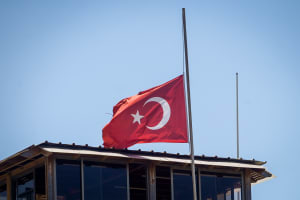A new Middle East? Arab nations openly join Israel in thwarting Iranian missile assault
Successfully foiling attack during Gaza War underlines shared common interests

The Iranian missile attack in the early hours of Sunday morning publicly revealed the Middle East Air Defense Alliance (MEAD) for the first time. This defense partnership has the potential to significantly reshape the Middle East in the foreseeable future.
The Israeli aerial defense array made military history by thwarting 99% of an Iranian attack by shooting down around 170 drones, 30 cruise missiles, and a reported 115 out of 120 ballistic missiles.
The Israeli Air Force (IAF) received significant assistance from allied nations during the operation. In addition to the expected support from the United States, the United Kingdom, and France, the kingdoms of Jordan and Saudi Arabia also contributed.
In a historic move, these two Arab kingdoms not only issued statements of support but actively contributed to the defense of the Israeli homeland – an unprecedented move that has led some observers to evoke a phrase made famous by former Israeli Prime Minister and President Shimon Peres: A New Middle East.
While flying under the radar, the alliance has been in the making for almost a decade, preceding and possibly even laying the groundwork for the Abraham Accords peace treaties signed between Israel and several Arab states in 2020.
The rationale of the alliance between former enemies began to take shape as the Iranian regime increased the pace of its operations across the Middle East over the past two decades.
Already controlling Lebanon through its terror proxy Hezbollah, Iran used the turmoil caused by the Iraq War and the Syrian Civil War to ostensibly take control over both countries, before building up the Yemeni Houthi rebels, thus creating a thorn in the side of Saudi Arabia and projecting its malicious influence to the strategic Straits of Hormuz.
In the face of Iranian regional aggression, as well as its nuclear ambitions, the moderate Sunni countries in the region suddenly found themselves aligned with Israel against the Shiite Islamic Republic.
“It’s not a new idea. We are talking about an idea that started in 2015 under [former IDF Chief of Staff Lt. Gen. Gadi] Eisenkot. It was the first time that regional defense became part of our strategy,” Brig.-Gen. Zvika Haimovich, then-commander of Israel’s aerial defense array, told The Jerusalem Post.
According to Haimovich, the idea at first was to bring the U.S. assets based in Arab countries across the region into a common framework to “provide a big umbrella to supply early warning to Israel.”
In 2020, the Abraham Accords partner nations joined the framework to create “one operational net that would connect all the sensors and assets and build one synchronized picture that each country could use to protect themselves,” he added.
As we understand today, the Kingdom of Jordan, which made peace with Israel in 1994 and is known to cooperate closely on security, and Saudi Arabia, which was close to normalization with Israel just before last Oct. 7, joined this alliance, at least informally.
In March 2022, the commander of the U.S. CENTCOM convened a secret meeting in Egypt between military representatives from Israel and several Arab nations to discuss a coordinated response against Iran in the event of an attack, according to a Wall Street Journal report.
The loose partnership was based on the common threat of Iran's drone and missile array and its proxies across the region, aiming to counter this threat by providing each other with early warning.
The seriousness of the issue was underlined by the 2019 attack on Saudi Aramco oil facilities via a combined drone and cruise missile strike launched by Iran and its Houthi militia, a strike that, looking back, should be seen as a harbinger of this week’s direct attack on Israel.
Last Sunday, the alliance passed its first serious test with flying colors, even if it reportedly required the U.S. to convince some nations to ignore Iranian threats against any country that would aid Israel during the assault.
Despite this, Saudi Arabia and the United Arab Emirates agreed to provide early intelligence, while Jordan opened its airspace to fighter jets from the U.S., the UK, and apparently even Israel, to intercept the projectiles.
The Royal Jordanian Air Force also took an active part in the effort by shooting down some drones by itself.
Hebrew news reports suggested that the Saudi Air Force could have intercepted some missiles being launched by the Houthis, as it had already done in the past.
While Saudi officials at first didn’t comment on the incident, on Monday an official told Israel’s KAN news outlet that “as a matter of sovereignty… every suspicious object that penetrates Saudi airspace is intercepted.”
Notably, the Saudi official also blamed Iran for “engineering” the Hamas Oct. 7 surprise invasion of Israel to derail normalization between Israel and Saudi Arabia.
Following the Iranian attack, IDF Chief of Staff Herzi Halevi thanked "all our international partners," adding that "across the skies of the Middle East, a coalition was activated to counter this attack."
Israeli Defense Minister Yoav Gallant stated that the threat was repelled together with the U.S. “and other countries.”
“We have an opportunity to establish a strategic alliance against this grave threat by Iran which is threatening to mount nuclear explosives on these missiles, which could be an extremely grave threat,” Gallant added.
Despite these unprecedented and positive developments, both Jordan and Saudi Arabia declined to condemn Iran for its attacks openly, instead framing their participation in the interceptions as mere defense of their respective airspace.
The success in foiling what might have been the largest missile and drone attack in history, amid the Gaza War, which until two weeks ago caused those same Arab nations to heavily criticize Israel, underlines the strength of the Abraham Accords and the defense alliance – even if for now, they are only based on shared interests rather than genuine friendship.
In a twist of fate, after numerous failed attempts at a two-state solution by left-wing Israeli governments, Israel’s right-wing Prime Minister Benjamin Netanyahu brought about the Abraham Accords, while right-leaning commentators today excitedly discuss the future possibilities of a regional alliance.
As Channel 12's chief political commentator Amit Segal described it: “There have been isolated occasions that this system has worked in the past, but yesterday we saw an unprecedented display at an international level – a new Middle East.”

Hanan Lischinsky has a Master’s degree in Middle East & Israel studies from Heidelberg University in Germany, where he spent part of his childhood and youth. He finished High School in Jerusalem and served in the IDF’s Intelligence Corps. Hanan and his wife live near Jerusalem, and he joined ALL ISRAEL NEWS in August 2023.
You might also like to read this:

















